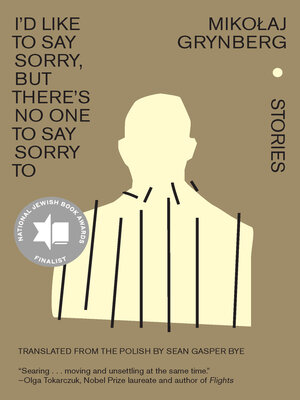
Sign up to save your library
With an OverDrive account, you can save your favorite libraries for at-a-glance information about availability. Find out more about OverDrive accounts.
Find this title in Libby, the library reading app by OverDrive.



Search for a digital library with this title
Title found at these libraries:
| Library Name | Distance |
|---|---|
| Loading... |
An exquisitely original collection of darkly funny stories that explore the panorama of Jewish experience in contemporary Poland, from a world-class contemporary writer
"These small, searing prose pieces are moving and unsettling at the same time. If the diagnosis they present is right, then we have a great problem in Poland." —Olga Tokarczuk, Nobel Prize laureate and author of Flights
Mikołaj Grynberg is a psychologist and photographer who has spent years collecting and publishing oral histories of Polish Jews. In his first work of fiction—a book that has been widely praised by critics and was shortlisted for Poland's top literary prize—Grynberg recrafts those histories into little jewels, fictionalized short stories with the ring of truth.
Both biting and knowing, I'd Like to Say Sorry, but There's No One to Say Sorry To takes the form of first-person vignettes, through which Grynberg explores the daily lives and tensions within Poland between Jews and gentiles haunted by the Holocaust and its continuing presence.
In "Unnecessary Trouble," a grandmother discloses on her deathbed that she is Jewish; she does not want to die without her family knowing. What is passed on to the family is fear and the struggle of what to do with this information. In "Cacophony," Jewish identity is explored through names, as Miron and his son Jurek demonstrate how heritage is both accepted and denied. In "My Five Jews," a non-Jewish narrator remembers five interactions with her Jewish countrymen, and her own anti-Semitism, ruefully noting that perhaps she was wrong and should apologize, but no one is left to say "I'm sorry" to.
Each of the thirty-one stories is a dazzling and haunting mini-monologue that highlights a different facet of modern Poland's complex and difficult relationship with its Jewish past.







